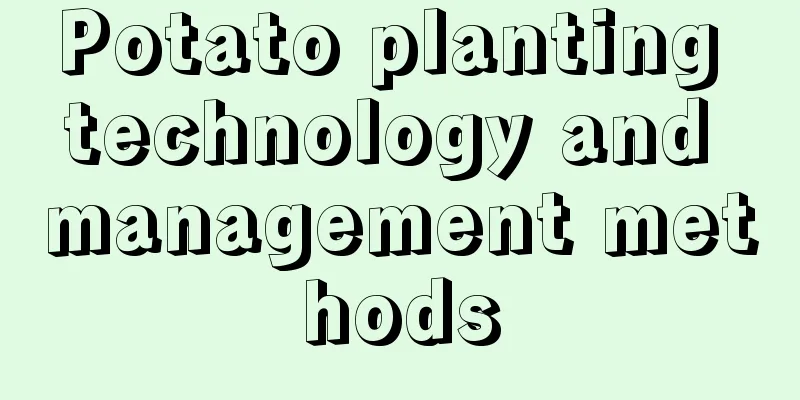Potato planting technology and management methods

|
Potato, commonly known as potato, is a crop widely grown throughout China, especially in spring. Although the planting and daily management of potatoes are relatively simple, some key planting techniques and management methods still need to be mastered to achieve high yields. Let's learn about potato planting techniques and management methods. 1. Choose the right variety Choose suitable high-yield potato varieties according to local climate and soil conditions. Different varieties have different adaptability to the environment. Choosing varieties with strong disease and pest resistance and high yield is the key to high yield. 2. Soil Preparation Potatoes prefer deep, well-drained soil rich in organic matter. Deep plowing should be carried out before planting to increase the soil's aeration and water retention capacity, while adjusting the soil pH to keep it neutral or slightly acidic. 3. Reasonable fertilization Potatoes need adequate fertilizer to support their growth, especially nitrogen, phosphorus and potassium fertilizers. Apply sufficient base fertilizer, such as fully decomposed organic fertilizer , and appropriate amount of chemical fertilizer to ensure adequate nutrient supply during potato growth. 4. Sowing at the right time Choose the appropriate sowing time according to local climatic conditions. Spring sowing is usually done when the soil temperature is stable at 7-8°C to ensure that the potatoes can germinate and grow smoothly. 5. Planting density Reasonably control the planting density to avoid being too dense or too sparse. Appropriate row and plant spacing can ensure that potatoes have enough space to grow while making full use of land and light resources. VI. Pest and disease control Check the growth of potatoes regularly to detect and deal with pests and diseases in a timely manner. Adopt an integrated control strategy, including agricultural control, physical control and chemical control, to reduce the impact of pests and diseases on potato yields . 7. Water Management Potatoes have a high demand for water, but are not tolerant to waterlogging. Irrigate properly, keep the soil moist, and avoid prolonged waterlogging to prevent the occurrence of potato root diseases. 8. Cultivation and loosening of soil During the growth of potatoes, timely tillage and loosening of the soil will help improve soil structure, promote root development, and reduce weed growth. 9. Plant Adjustment During the growth of potatoes, appropriate adjustments should be made to the plants, such as topping and pruning, to control the growth of the plants and promote the concentrated supply of nutrients to the underground tubers. 10. Harvest at the right time Harvest potatoes in time according to their maturity to avoid harvesting too late which may cause the potatoes to deteriorate in quality or suffer frost damage. The above is the application of potato planting technology and management methods, which can effectively improve the yield and quality of potatoes and maximize the economic benefits of agricultural planting.
|
<<: How to remedy yellow leaves of asparagus fern
Recommend
Formula of special insecticide for thrips
Piercing-sucking pests such as aphids, whiteflies...
The correct way to water Phalaenopsis
1. Judgment of water shortage Before watering the...
How to propagate purple-backed arrowroot
The propagation of purple-backed arrowroot by div...
How to propagate mallow through sowing
How to propagate mallow through sowing There are ...
Does the flower stem need to be cut off after the flower moon night blooms?
Will the flower bloom on a moonlit night? Huayuey...
Why does the one-leaf orchid not grow?
1. The soil is not breathable or has too few nutr...
The wastewater that every household has is actually a universal water for growing flowers. It can make whatever you grow grow well!
Use air-conditioning water to water flowers, and ...
The correct way to water daffodils and how to fertilize them
1. Correct way of watering 1. Frequency: Daffodil...
What to do if the leaves of coral fern wilt and turn yellow
Growth habits of coral fern Coral ferns like a hu...
How often should bamboo be watered?
How often should bamboo be watered? Bamboo is a p...
How to grow corn in saline-alkali soil
1. Soil improvement Corn cannot tolerate saline-a...
How to prune the rich tree
How to prune the branches of the rich tree The ri...
The efficacy and function of Lycopodium
1. Diuretic Lycopodium can effectively relieve sp...
When to plant kiwi seedlings
1. When to plant It is better to plant this type ...
What kind of flowerpot is good for jasmine?
What kind of flowerpot is suitable for jasmine? J...









